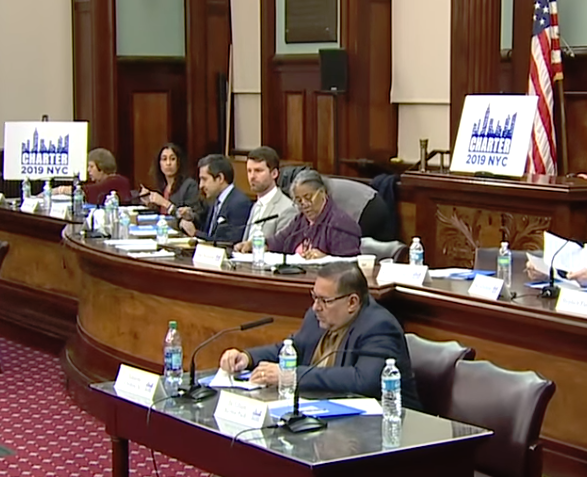
2019 Charter Commission
Chairwoman Gail Benjamin heads a charter revision process that has the broadest remit of any panel in 30 years.
Three decades ago, New York was chastened into a sweeping charter revision by a Supreme Court ruling that found the city in violation of an elemental principle of U.S. democracy.
Beginning last year, a charter revision commission launched by the City Council considered changes of similar scope—of its own accord. It looked at dramatic revisions to how campaign finance works, how the city’s budget is developed and how land-use decisions are made.
This week, the 2019 commission began winnowing its work down to the questions that it will put on the ballot in November. And the focus discernibly shifted from the sweeping to the particular.
In a preliminary report, the commission’s staff chose not to recommend consideration of a comprehensive planning system, instead recommended more coordinated use of existing planning mechanisms. The staff also did not recommend democracy vouchers to replace private campaign donations.
While the commissioners, not the staff, will have the final say about what the final questions are, the biggest idea on the table now is whether to move to a system of “ranked choice voting” to avoid runoff elections. Staff also recommended the commission consider questions on the timing of special elections and the timing of the decennial redistricting process.
There was intense focus on the Civilian Complaint Review Board (CCRB), where the staff recommended consideration of questions relating to giving officials other than the mayor direct appointments to the board, giving CCRB staff subpoena power and requiring the police commissioner to provide an explanation when the discipline he orders differs from that recommended by the CCRB, among other ides.
Budgeting powers also received a lot of attention, with the staff recommending consideration of questions about the size of “units of appropriation” in the budget, limiting the power of the mayor to “impound” money he doesn’t want to spend, the timing of revenue estimates, the creation of a “rainy day” fund and automatic budgets (based on a percentage of the city budget) for offices like public advocate and entities like the CCRB.
The staff also wants the commission to consider questions about whether the public advocate and comptroller should get votes on the Conflict of Interest Board, and to strengthen the restrictions on lobbying that former city employees face. Other topics targeted for future discussion include giving the City Council advice-and-consent power over the appointment of Corporation Counsel, new rules for defining when there is a legal conflict among city entities and how to pay for outside legal help when it occurs, subpoena power for the public advocate, and appointment of a citywide director of efforts to improve the representation among city contractors of minority- and woman-owned businesses
On land use, the staff called for considering creating a “pre-certification comment period” to allow rezonings and other proposals to be shaped somewhat by civic feedback before the time-constrained Uniform Land Use Review Procedure starts. They also called for the ULURP clock on community boards to be lengthened during the summer, when boards meet rarely and public meetings struggle to get attendance.
When it comes to comprehensive planning, the staff identified multiple planning functions within the existing charter (like Borough Strategic Policy Statements, the City Strategic Policy Statement, Ten-Year Capital Strategy, Four-Year Capital Program, 197-a plans and Citywide Statement of Needs) and recommended the commission thinking about changing the charter to “make clear how these various planning documents should relate to and impact one another and ensure that the timing and development of such plans facilitates that end” and “ensure that such plans address anticipated future planning challenges and include specific indicators for measuring progress consistently throughout such documents and over time.” Advocates who saw deep issues with equity and scope in the current are unlikely to be satisfied by that.
Wednesday on the WBAI Max & Murphy Show, commission chairwoman Gail Benjamin and Citizen Budget Commission executive director Carol Kellerman talked about the staff report and where charter revision goes from here.









2 thoughts on “Max & Murphy: Amid Calls for Sweeping Charter Reform, Panel Aims Toward Modest Changes”
Recently at a forum on this subject Carl Wiesbrod recalled a conversation with Eric Lane, architect of the 1989 charter changes. A conversation Lane held with then “Speaker” Vallone about the conceivable possibility that any member of the City Council could alone veto any land use change. Vallone thought that was not reasonable and would work to see it never happened. Well it’s a new day and a new City Council. No mention of this real issue in any of the proposed changes? It would have been useful with the Kingsbridge Armory proposal in the Bronx now dead or with the Industry City proposal now being held up in Brooklyn.
Local council members have an effective veto over zoning changes in their respective districts but it not codified anywhere. It’s not a perfect system but it protects neighborhoods from being overwhelmed with inappropriate developments. The local CM knows their neighborhood best.